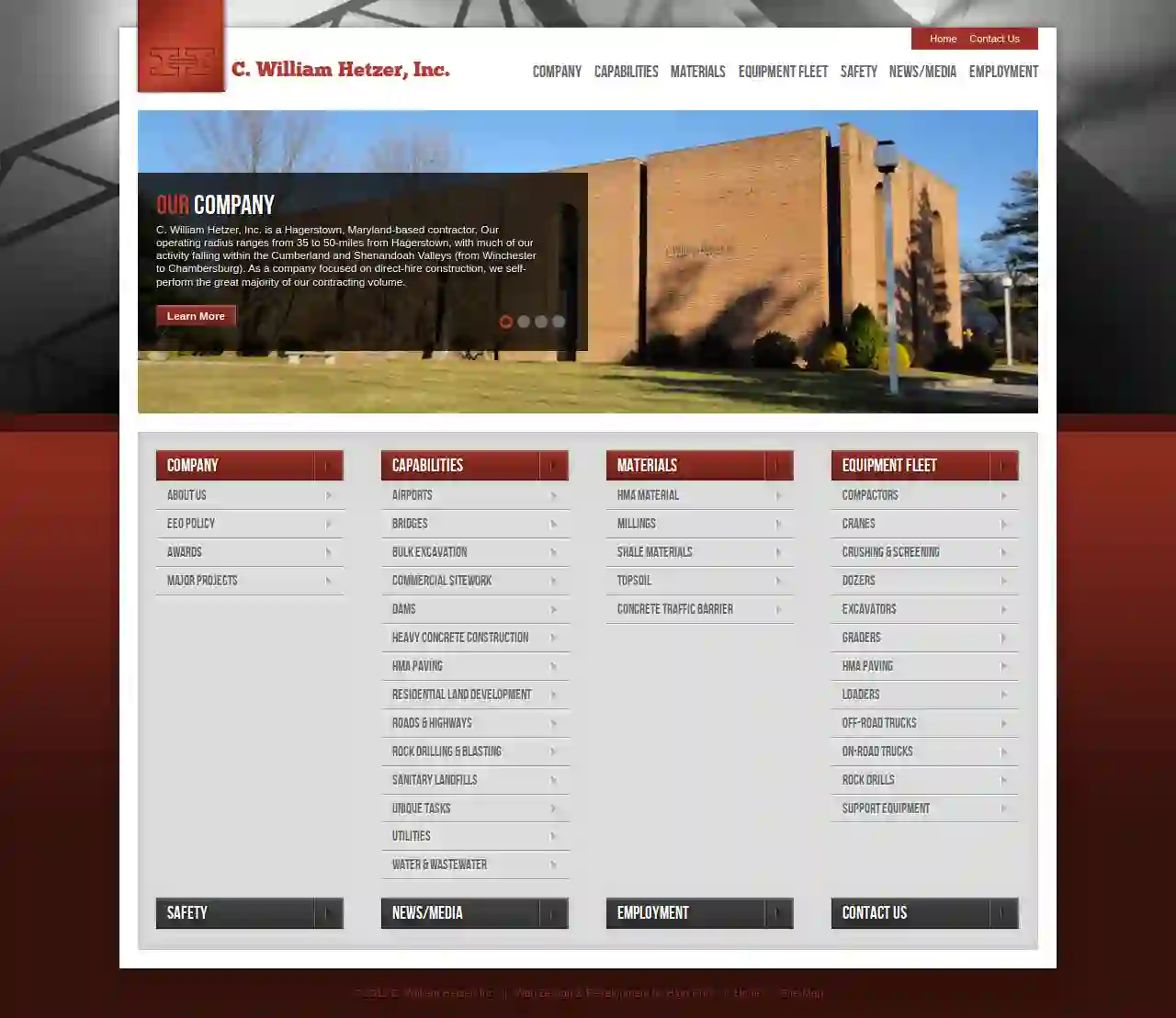Excavation Contractors Fayetteville
Find Excavation Services in Fayetteville
Get up to 3 Excavating Contractors quotes for your project today! Compare profiles, reviews, accreditations, portfolio, etc... and choose the best offer.
- Re
Reginald R Miller & Sons
52 reviewsFayetteville, US- Services
- Why Us?
Get Quote - G
G C Excavating & Construction
52 reviewsFayetteville, US- Services
- Why Us?
Get Quote - Da
David M. Merchant, Inc. Excavating Contractor
51 reviewsFayetteville, US- Services
- Why Us?
Get Quote - SM
SMITHSTONIAN CONTRACTING, LLC
51 reviewsFayetteville, US- Services
- Why Us?
Get Quote - T.
T. Byers Contracting & Excavating Inc.
55 reviewsFayetteville, US- Services
- Why Us?
Get Quote - I
I & V Excavation & Construction, LLC
1Fayetteville, US- Services
- Why Us?
Get Quote 
C William Hetzer Inc Asphalt
4.510 reviews10104 Mapleville Road, Hagerstown, 21740, USAbout C. William Hetzer, Inc. C. William Hetzer, Inc. is a Hagerstown, Maryland-based contractor with a strong reputation for quality and performance. We specialize in heavy civil, highway, utility, and site construction, serving clients across Maryland, Virginia, West Virginia, and Pennsylvania. Our operating radius generally extends within 50 miles of Hagerstown, encompassing the Cumberland and Shenandoah Valleys. Founded in 1950 and incorporated in 1955, we have a long history of successful projects. We are committed to direct-hire construction, ensuring that the majority of our work is self-performed by our skilled and experienced team. Our commitment to quality is reflected in our extensive and well-maintained fleet of equipment. We are proud of our dedication to safety and our commitment to equal employment opportunity. We are also recognized for our contributions to the community through our involvement in various projects and initiatives.
- Services
- Why Us?
- Gallery
Get Quote
United Wreckers & Excavators
11 reviewsFayetteville, USWe are sorry, but the website you are trying to access is currently unavailable. Please try again later.
- Services
- Why Us?
- Gallery
Get Quote- Al
Allegany Contracting Inc
1Fayetteville, US- Services
- Why Us?
Get Quote - R
R L Divelbiss Excavating
51 reviewsFayetteville, US- Services
- Why Us?
Get Quote
Over 21,512+ Excavation Pros on our platform
Our excavation companies operate in Fayetteville and surroundings!
ExcavationHQ has curated and vetted Top Excavation Contractors in and around Fayetteville. Find the most trustworthy pro today.
Frequently Asked Questions About Excavation Contractors
- Spring and Fall: Often considered favorable due to moderate temperatures and drier soil conditions.
- Summer: Can be suitable, but hot weather can make working conditions challenging and might require additional measures (shade, hydration) for workers.
- Winter: Excavation in winter can be more difficult due to frozen ground, snow, and potential delays caused by inclement weather. It might also require specialized equipment or techniques.
- Soil Type and Stability: Stable, cohesive soils allow for deeper excavations than loose or unstable soils.
- Groundwater Level: Excavations below the water table require dewatering techniques to manage water intrusion.
- Equipment and Resources: The size and capabilities of excavation equipment influence the achievable depth.
- Safety Regulations: OSHA and other safety regulations impose limitations on trench depths without proper shoring or sloping.
- Project Requirements: The purpose of the excavation (basement, pool, foundation) determines the necessary depth.
- Trench Collapses: Unstable trench walls can cave in, posing a severe risk to workers. Proper shoring and sloping are crucial safety measures.
- Utility Damage: Striking underground utilities (gas, water, electric) can cause leaks, explosions, or electrocution. Accurate utility locates and careful digging are essential.
- Falling Objects: Materials or equipment falling into excavations can injure workers. Securing work areas and using appropriate safety gear is vital.
- Equipment Accidents: Operating heavy machinery involves risks of rollovers, collisions, or mechanical failures. Trained operators and proper equipment maintenance are critical.
- Environmental Hazards: Excavated soil might contain hazardous materials (asbestos, lead). Proper testing and disposal procedures are necessary.
- Hauling to Designated Disposal Sites: Transporting excavated material to approved landfills or recycling centers.
- Recycling or Reuse: If suitable, some excavated soil might be recycled for other projects or reused on-site for landscaping or backfilling.
- Complying with Regulations: Adhering to local and environmental regulations for soil disposal to prevent contamination or illegal dumping.
What is the best time of year for excavation?
How deep can you excavate?
What are the risks associated with excavation?
How do you handle soil disposal after excavation?
What is the best time of year for excavation?
- Spring and Fall: Often considered favorable due to moderate temperatures and drier soil conditions.
- Summer: Can be suitable, but hot weather can make working conditions challenging and might require additional measures (shade, hydration) for workers.
- Winter: Excavation in winter can be more difficult due to frozen ground, snow, and potential delays caused by inclement weather. It might also require specialized equipment or techniques.
How deep can you excavate?
- Soil Type and Stability: Stable, cohesive soils allow for deeper excavations than loose or unstable soils.
- Groundwater Level: Excavations below the water table require dewatering techniques to manage water intrusion.
- Equipment and Resources: The size and capabilities of excavation equipment influence the achievable depth.
- Safety Regulations: OSHA and other safety regulations impose limitations on trench depths without proper shoring or sloping.
- Project Requirements: The purpose of the excavation (basement, pool, foundation) determines the necessary depth.
What are the risks associated with excavation?
- Trench Collapses: Unstable trench walls can cave in, posing a severe risk to workers. Proper shoring and sloping are crucial safety measures.
- Utility Damage: Striking underground utilities (gas, water, electric) can cause leaks, explosions, or electrocution. Accurate utility locates and careful digging are essential.
- Falling Objects: Materials or equipment falling into excavations can injure workers. Securing work areas and using appropriate safety gear is vital.
- Equipment Accidents: Operating heavy machinery involves risks of rollovers, collisions, or mechanical failures. Trained operators and proper equipment maintenance are critical.
- Environmental Hazards: Excavated soil might contain hazardous materials (asbestos, lead). Proper testing and disposal procedures are necessary.
How do you handle soil disposal after excavation?
- Hauling to Designated Disposal Sites: Transporting excavated material to approved landfills or recycling centers.
- Recycling or Reuse: If suitable, some excavated soil might be recycled for other projects or reused on-site for landscaping or backfilling.
- Complying with Regulations: Adhering to local and environmental regulations for soil disposal to prevent contamination or illegal dumping.